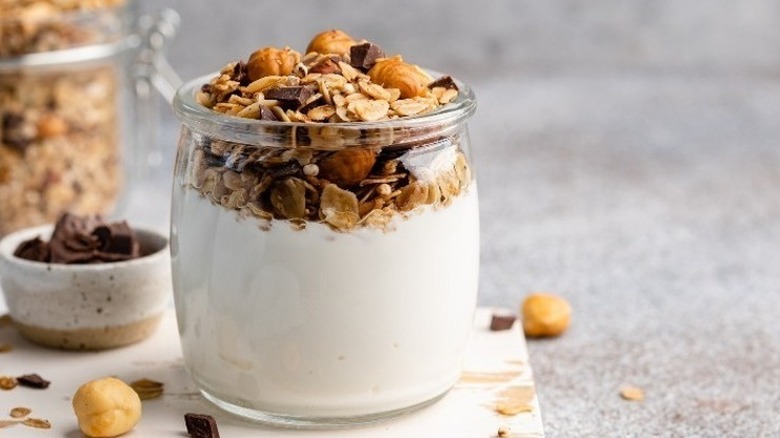This Healthy Seed Has More Protein Than Beef
If you're on the path to a healthier lifestyle, common advice you'll hear — aside from reducing sugar — is to increase your protein intake. Protein, a critical nutrient composed of amino acids, plays a crucial role in a wide range of bodily functions. According to Healthline, these include regulating the immune system, growing and maintaining body tissues, and driving the body's metabolic reactions.
As a macronutrient, you should consume significant amounts of protein. Mayo Clinic Health System advises that protein should make up 10% to 35% of your daily caloric intake. Considering the National Institutes of Health's recommendation of 2,000 calories per day for women and 2,500 for men to maintain weight, this translates to a protein intake of approximately 50 to 175 grams for women and 62 to 219 grams for men.
While meat and eggs might be the go-to sources, they aren't the only options. You don't have to load up on steak for every meal to get your protein fix. There's a whole world of different protein sources to keep your body happy.
Case in point, hemp seeds have protein content comparable to that of lamb and beef by weight. According to the U.S. Department of Agriculture (USDA), 100 grams of hemp provides 31.6 grams of protein. This exceeds the 23.7-gram protein content of a 100-gram grilled rib-eye steak, per USDA.
Can you replace meat with these plant-based proteins?
Growing evidence shows that shifting to plant-based proteins for your protein needs provides many health benefits. A 2018 study published in the International Journal of Epidemiology looked into the diets of 81,337 people using a questionnaire and found some pretty interesting results.
They discovered that those who got their protein from seeds and nuts had a lower risk of death from heart-related diseases compared to those who mainly ate meat. So, swapping some of that meat for plant-based proteins is excellent for adding more variety to your protein source options and could be a heart-smart move!
In the same vein, hemp seeds offer a range of other benefits besides being an excellent protein source. The Cleveland Clinic highlights that hemp seeds are rich in polyunsaturated fatty acids (PUFAs), omega-3 and omega-6, and antioxidants. These nutrients are beneficial for health and may help prevent the development of chronic diseases like diabetes, heart disease, and stroke.
A 2010 study published in Nutrition & Metabolism looked at the beneficial effects of linoleic acid, which is richly found in hempseed, on heart health. Aside from decreasing cholesterol levels, dietary intake of linoleic acid can also help prevent and control high blood pressure and possibly reduce the risk of coronary heart disease and atherosclerosis.
How to increase your protein intake
Don't worry; wanting to increase your protein intake doesn't mean you have to jump on the vegetarian or vegan bandwagon. You can still have a healthy and diverse diet with protein from various sources. Variety is the spice of life, and your meals can be just as exciting with a combo of plant-based proteins like beans and lentils and lean animal proteins like poultry and fish. The key is balance and finding what works best for your lifestyle and body.
You can simply add hemp seeds to your current meal plan by sprinkling them on your favorite yogurt, salad, or cereal. If you're into baking, use hemp seed flour and top your favorite muffins with hemp seed hearts. Planning to hit the gym? You can add hemp to your shake or even replace your protein powder with hemp protein powder. If you're looking for other options, you can always munch on cheese and edamame and add sprinkles of chia seeds or chopped almonds into your snack to increase your protein without having to consume too much meat. And don't forget quinoa — it's a fantastic rice substitute!



